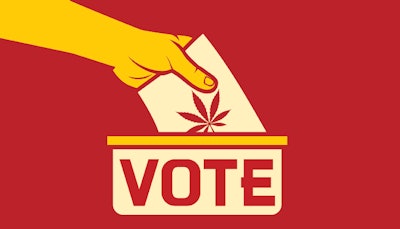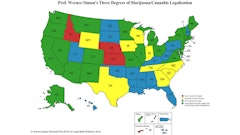
Massachusetts is perhaps one of the most tantalizing, but at times most frustrating states to have legalized the adult use and regulated sale of cannabis. With some history of challenges regarding marijuana laws, the state now has extended the deadlines set forth in the voter-approved Question 4. The industry faces some potentially unfavorable changes to the act that legalized recreational cannabis, as the state government puts forth guidelines for establishing a regulatory framework for cannabis cultivation and sale.
While the Commonwealth rolled out a medical marijuana licensing framework in 2012, today there are just 17 licensed facilities throughout the state, including both cultivation and retail establishments.
More than other states, Massachusetts has a long tradition of strong municipal “home rule” authority, and its 351 cities and towns have thus far jealously guarded their total control over proposed cannabis operations within their boundaries. The botched rollout of the state’s medical marijuana program, under the Department of Public Health of a previous gubernatorial administration, showcased another of the Commonwealth’s well-worn attributes: government dysfunction.
Today, however, the medical marijuana regulatory regime is functioning smoothly, and the pipeline of provisionally licensed medical marijuana operators is clearing as municipal zoning authorities—to varying degrees of reluctance—begin issuing permits for dispensaries and cultivation facilities to be built.
The 2016 referendum legalizing adult use passed by a sizable margin, a recognition not just of Massachusetts’ voters’ agreement with the policy, but of the sensibility and cohesion of the law’s specific elements. Although the Legislature has intervened to push back all operative deadlines in the new law by six months—with more legislative changes expected by this summer—the Massachusetts cannabis market is poised for rapid growth and expected to become a billion-dollar market by 2020. Unlike many other areas where adult use is now legal under state law, Massachusetts is a short drive–or train or bus ride–from the nation’s densest population centers. The steady stream of college students, tourists and other visitors make Massachusetts an opportune market.
Legislative Developments
Unlike other adult use states, Massachusetts immediately pumped the brakes on building the regulatory framework for licensing the new industry. Part of this is understandable; the referendum appropriates no money for the new Cannabis Control Commission.
In the final days of 2016, Gov. Charlie Baker signed a bill delaying the opening of all recreational marijuana retail operations in Massachusetts by six months. The way the House and the Senate approved the delay—without public notice, public hearing or discussion during a lightly attended informal joint session—garnered a fair degree of criticism.
In addition to delaying all licensing deadlines in the referendum, the new bill also extended the deadline for the creation of the Cannabis Control Commission, as well as the deadline for the Commission to generate detailed regulations for licensing, packaging and more.
The full list of postponed deadlines is as follows:
- Sept. 1, 2017. The state treasurer must make initial appointments to the Cannabis Control Commission (previously March 1, 2017).
- Aug. 1, 2017. The governor must make initial appointments to the Cannabis Advisory Board—a panel without regulatory authority that makes recommendations to the Commission (previously Feb. 1, 2017).
- March 15, 2018. The Commission must promulgate marijuana regulations (previously Sept. 15, 2017).
- April 1, 2018. The Commission must begin accepting licensing applications for one dispensary, cultivator and/or product manufacturer license from entities that hold final or provisional registrations to operate medical marijuana locations from the Department of Public Health under the medical licensing regulations.
- April 1, 2018. The Commission must begin accepting licensing applications for marijuana testing facilities (previously Oct. 1, 2017).
- April 1, 2019. The Commission must begin accepting applications from all retail and manufacturer applicants.
- April 1, 2020. The Commission must begin accepting applications from all cultivator applicants.
In February, legislative leaders also appointed a joint committee to recommend changes to the current law. While a notorious foe of adult use was appointed to the committee by the Senate Majority Leader, the panel is chaired by a proponent on the Senate side and a representative who took no formal position on the referendum on the House side. The committee may consider a rash of bills that have been introduced, some very unfavorable to the industry, such as: measures creating a new independent regulatory commission that would be less accountable than the commission modeled on the Commonwealth’s alcohol licensing framework; delaying sales of edibles for two years; and allowing municipalities through their City Councils or Boards of Selectmen to ban cannabis operations without a citywide vote.
The tweaks passed by the Legislature are sure to be informed by the position of Gov. Baker. He recently told a newspaper that he would like a bill outlining changes to the current law on his desk by May, and that he hopes new legislation addresses at least four issues that he sees as critical:
- greater local control;
- a cap on potency;
- child-safety regulations; and
- personal-use plant-growing regulations that best ensure black-market dealings are eliminated.
The local control issues continue to be vexing. The governor said he is particularly worried about business density; according to him, marijuana retailers in Colorado are clustered in lower-income neighborhoods. To avoid a similar situation in Massachusetts, Gov. Baker would favor of a bill that limits the number of retailers per neighborhood.
That may be viable, but to repeal the referendum’s restriction on municipality’s authority to outright ban operations (absent a full citywide vote) would exacerbate the very problem the governor warns against. If the wealthiest municipalities are free to ban shops, then they will inevitably become cloistered in lower-income neighborhoods in the cities and towns that most need the revenue. While driving revenue in lower-income neighborhoods is a positive, the drafters of the referendum and the Governor rightfully expect that both the benefits and burdens of adult use are shared equally among municipalities.
It is going to be a busy few months at the state Legislature before the task of creating a licensing regime moves to the Cannabis Control Commission this autumn. Opportunity—and likely more frustration—await in Massachusetts.

























